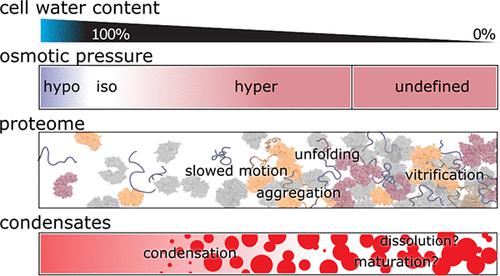当前位置:
X-MOL 学术
›
Chem. Rev.
›
论文详情
Our official English website, www.x-mol.net, welcomes your
feedback! (Note: you will need to create a separate account there.)
When Phased without Water: Biophysics of Cellular Desiccation, from Biomolecules to Condensates
Chemical Reviews ( IF 51.4 ) Pub Date : 2023-05-03 , DOI: 10.1021/acs.chemrev.2c00659 Paulette Sofia Romero-Perez 1 , Yanniv Dorone 2, 3 , Eduardo Flores 1 , Shahar Sukenik 1, 4, 5 , Steven Boeynaems 6, 7, 8, 9, 10
Chemical Reviews ( IF 51.4 ) Pub Date : 2023-05-03 , DOI: 10.1021/acs.chemrev.2c00659 Paulette Sofia Romero-Perez 1 , Yanniv Dorone 2, 3 , Eduardo Flores 1 , Shahar Sukenik 1, 4, 5 , Steven Boeynaems 6, 7, 8, 9, 10
Affiliation

|
The molecular machinery that enables life has evolved in water, yet many of the organisms around us are able to survive even extreme desiccation. Especially remarkable are single-cell and sedentary organisms that rely on specialized biomolecular machinery to survive in environments that are routinely subjected to a near-complete lack of water. In this review, we zoom in on the molecular level of what is happening in the cellular environment under water stress. We cover the various mechanisms by which biochemical components of the cell can dysfunction in dehydrated cells and detail the different strategies that organisms have evolved to eliminate or cope with these desiccation-induced perturbations. We specifically focus on two survival strategies: (1) the use of disordered proteins to protect the cellular environment before, during, and in the recovery from desiccation, and (2) the use of biomolecular condensates as a self-assembly mechanism that can sequester or protect specific cellular machinery in times of water stress. We provide a summary of experimental work describing the critical contributions of disordered proteins and biomolecular condensates to the cellular response to water loss and highlight their role in desiccation tolerance. Desiccation biology is an exciting area of cell biology, still far from being completely explored. Understanding it on the molecular level is bound to give us critical new insights in how life adapted/can adapt to the loss of water, spanning from the early colonization of land to how we can deal with climate change in our future.
中文翻译:

无水分相时:细胞干燥的生物物理学,从生物分子到冷凝物
维持生命的分子机制是在水中进化的,但我们周围的许多生物体甚至能够在极度干燥的条件下生存。尤其引人注目的是单细胞和固定生物,它们依靠专门的生物分子机制在通常几乎完全缺水的环境中生存。在这篇综述中,我们在分子水平上重点关注水分胁迫下细胞环境中所发生的情况。我们介绍了细胞的生化成分在脱水细胞中产生功能障碍的各种机制,并详细介绍了生物体为消除或应对这些干燥引起的扰动而进化出的不同策略。我们特别关注两种生存策略:(1)使用无序蛋白质在干燥之前、期间和恢复过程中保护细胞环境,以及(2)使用生物分子凝聚物作为自组装机制,可以隔离或在缺水时保护特定的细胞机器。我们总结了实验工作,描述了无序蛋白质和生物分子缩合物对细胞失水反应的关键贡献,并强调了它们在干燥耐受性中的作用。干燥生物学是细胞生物学中一个令人兴奋的领域,但仍远未得到完全探索。在分子水平上理解它必将为我们提供关于生命如何适应/能够适应水流失的重要新见解,从早期的土地殖民到我们如何应对未来的气候变化。
更新日期:2023-05-03
中文翻译:

无水分相时:细胞干燥的生物物理学,从生物分子到冷凝物
维持生命的分子机制是在水中进化的,但我们周围的许多生物体甚至能够在极度干燥的条件下生存。尤其引人注目的是单细胞和固定生物,它们依靠专门的生物分子机制在通常几乎完全缺水的环境中生存。在这篇综述中,我们在分子水平上重点关注水分胁迫下细胞环境中所发生的情况。我们介绍了细胞的生化成分在脱水细胞中产生功能障碍的各种机制,并详细介绍了生物体为消除或应对这些干燥引起的扰动而进化出的不同策略。我们特别关注两种生存策略:(1)使用无序蛋白质在干燥之前、期间和恢复过程中保护细胞环境,以及(2)使用生物分子凝聚物作为自组装机制,可以隔离或在缺水时保护特定的细胞机器。我们总结了实验工作,描述了无序蛋白质和生物分子缩合物对细胞失水反应的关键贡献,并强调了它们在干燥耐受性中的作用。干燥生物学是细胞生物学中一个令人兴奋的领域,但仍远未得到完全探索。在分子水平上理解它必将为我们提供关于生命如何适应/能够适应水流失的重要新见解,从早期的土地殖民到我们如何应对未来的气候变化。











































 京公网安备 11010802027423号
京公网安备 11010802027423号